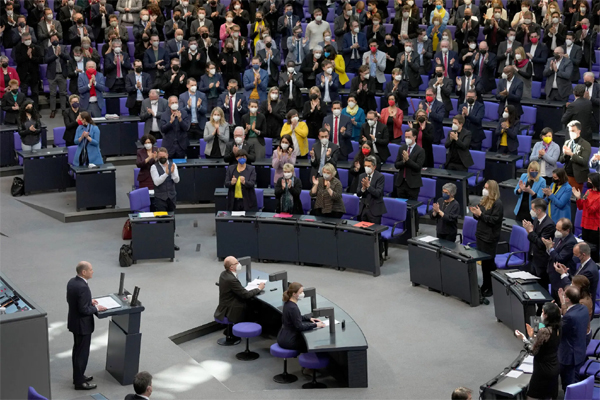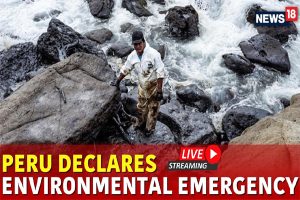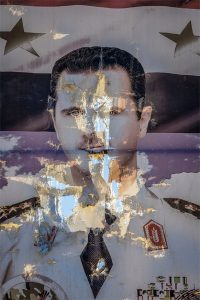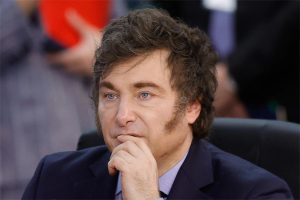
Olaf Scholz announced a strategic shift for his country, already doubts are emerging about how real and deep it is. (Michael Sohn/AP).
Katrin Bennhold and Steven Erlanger, NYTimes
BERLIN
EnergiesNet.com 04 13 2022
Chancellor Olaf Scholz surprised the world, and his own country, when he responded to Russia’s invasion of Ukraine with a 100-billion-euro plan to arm Germany, send weapons to Ukraine and end his nation’s deep dependence on Russian energy.
It was Germany’s biggest foreign policy shift since the Cold War, what Mr. Scholz called a “Zeitenwende” — an epochal change — that won applause for his leadership at home and abroad.
But six weeks later, the applause has largely ceased. Even as images of atrocities emerge from Ukraine since the invasion by President Vladimir V. Putin of Russia, Mr. Scholz has ruled out an immediate oil and gas embargo, saying it would be too costly. He is dragging his feet on sending 100 armored vehicles to Ukraine, saying that Germany must not “rush ahead.” There are new debates in the ruling coalition about just how to go forward with the massive task Mr. Scholz has laid out, let alone how fast.
Already doubts are building as to the German government’s commitment to its own radical plans. “Zeitenwende is real, but the country is the same,” said Thomas Bagger, a senior German diplomat who will be the next ambassador to Poland. “Not everyone likes it.”
The changes Mr. Scholz announced go far deeper than his commitment to spend 2 percent of gross domestic product on the military — some €70 billion ($76 billion) a year, compared with France’s €41 billion ($44 billion).
They go to the heart of Germany’s postwar identity as a peaceful exporting nation — and to the heart of a business model that has enriched Germany and made it Europe’s largest and most powerful economy.
Now Germans are being asked “to rethink everything — our approach to doing business, to energy policy, to defense and to Russia,” said Claudia Major, a defense expert at the German Institute for International and Security Affairs. “We need a mind-set change. We need to recognize that this is about us — that power politics are back and Germany must play a role.”
But she added, “Once again Germany is not leading, it is being dragged.”
Truly reorienting Germans for a new world where security has its real costs — not only in terms potentially of lost lives, but also in lost trade, higher energy prices, slimmer profits and lower economic growth — will be a wrenching endeavor that will take time, even a generation, and more than an afternoon’s policy pronouncement.

That realization is dawning, for Germans and their frustrated European partners.
“I don’t understand how anyone in Germany can sleep at night after seeing horrors like this without doing anything about it,” said Andriy Melnyk, Ukraine’s outspoken ambassador in Berlin, referring to the atrocities in Ukraine. “What does it take for Germany to act?”
Even Annalena Baerbock, the self-assured Green foreign minister, expressed concerns that Zeitenwende may be more temporary than fundamental. She said she worried that the consensus was fragile, that Germans who favor close ties to Russia were silent now, but had not changed their views.
“You can feel this,” she said in an interview. “They know they have to do it right now with regard to sanctions, energy independence and weapons deliveries, also with regard to how we treat Russia. But actually, they don’t like it.”
Since Mr. Scholz put forth his Zeitenwende before a special session of the Parliament on Feb. 27, multiple cracks in Germany’s commitment to change have already begun to appear.
German celebrities made headlines with an appeal to the government against rearmament and the “180-degree change in German foreign policy” that has so far been signed by 45,000 people. Green lawmakers have lobbied to spend only part of the €100 billion special fund on the military, citing other needs like “human security” and climate change. Labor unions and industry bosses are warning of catastrophic damage to the economy and an immediate recession if Russian gas stops flowing.
As the chief executive of the German chemicals giant BASF, Michael Heinz, put it last week: “Cheap Russian energy has been the basis of our industry’s competitiveness.”
It has in fact been the basis of the German economy. Now that German businesses are facing the possibility of being asked to do without it, resistance is quietly mounting. Government ministers say they are being asked discreetly by business leaders when things will “go back to normal” — that is, when they can return to business as usual.
Ever since the fall of the Berlin Wall and German reunification, business as usual has largely meant “change through trade” — the conviction that economic interdependency would alter authoritarian governments like Russia and China for the better and help keep the peace. Prosperity and democracy, the thinking went, go hand in hand.
The link to Russia is particularly complicated by a long and complex history of hot and cold war, including guilt over the millions of Russians killed by the Nazis. This reinforced the belief that the security architecture of Europe had to include Russia and take account of Russian interests.

It was a model that paid off nicely for Germany, too.
“We export to China and import cheap gas from Russia, that’s been the recipe for the German export success,” said Ralph Bollmann, a biographer of Angela Merkel, the former German chancellor who is now seen as having protected Germans from a rivalrous world, but not preparing them for it.
Few in Germany, including its intelligence services, predicted that Mr. Putin would invade a sovereign European country. But the war has set off a cycle of soul-searching, even among prominent politicians like Frank-Walter Steinmeier, the former foreign minister and now federal president.
A senior member of Mr. Scholz’s Social Democratic Party, he was a prominent supporter of the Nord Stream 2 natural-gas pipeline, now halted, that bypassed Ukraine and that Washington opposed.
“We were clinging to the idea of building bridges to Russia that our partners warned us about,” Mr. Steinmeier said, after Mr. Melnyk, the Ukrainian ambassador, accused him of enabling Mr. Putin. “We failed to build a common Europe,” Mr. Steinmeier said. “We failed to incorporate Russia in our security architecture.” He added: “I was wrong.”
In the immediate aftermath of Mr. Scholz’s Zeitenwende speech, the details of which he had shared with only a handful of people, the resolve to act decisively seemed palpable.
The three diverse parties in his coalition swung behind it and partisan divisions with the conservative opposition were briefly forgotten, too. Public opinion mirrored the shift, rewarding the new chancellor with better popularity ratings.
Russia-Ukraine War: Key Developments
Putin’s remarks. President Vladimir V. Putin of Russia insisted that his war in Ukraine would succeed and that peace talks had reached a “dead end.” Mr. Putin’s defiant comments came as Russia poured more military vehicles, artillery and troops into eastern Ukraine, presaging a bloody new chapter in the conflict.
Concerns of escalation. Ukraine is bracing for a Russian assault along its eastern front, and Ukrainian officials have warned civilians that time is running out to escape. After meeting with Mr. Putin, Austrian Chancellor Karl Nehammer said he fears that the Russian president intends to drastically intensify the brutality of the war.
More evidence of atrocities. Officials continued to document and expose atrocities committed by Russian forces around Kyiv, in what a growing number of Western officials claim are war crimes. Times reporters and photographers went to Bucha to uncover new details of the execution-style killings of civilians.
But in a short time the breadth of the change Mr. Scholz announced seems to have intimidated even his own three-party coalition. “The government has made some courageous decisions, but it can seem afraid of its own courage,” said Jana Puglierin, director of the Berlin office of the European Council on Foreign Relations.
There is skepticism that the political establishment is ready to break fundamentally from Moscow, or that German voters will happily pay so much more for energy and food for the foreseeable future.
“German pacifism runs very deep,” said John Kornblum, a former American ambassador to Germany who has lived in the country on and off since the 1960s. “German illusions may have shattered, but not its traumas about Russia and the war.”
That “neurotic relationship with Russia may be on pause for the moment, but it will return in full force as soon as the shooting stops,” he said.

Nils Schmid, foreign policy spokesman in Parliament for the Social Democrats, said that Germany’s soft stance toward Russia “reflects German society, and what will remain is this idea that Russia is there and part of Europe, and we will have to deal with that.”
The war has produced “dashed hopes” of a peaceful united Europe, shared by his generation of 1989, he said. But he noted that with this war, “There can be no return to business as usual,” adding, “No one really wants to go back to the old times of engagement with Russia.”
Still, he said, “We shouldn’t overdo it. The balance will shift to more deterrence and less dialogue. But we must keep some dialogue.”
Ms. Puglierin has little patience for such arguments. “People need to let these old ideas go and adapt to reality as it is, and not as they want it to be,” she said. “Russia has shown that it does not want a stable relationship on this existing security order, which is now an empty shell.”
A prominent conservative lawmaker, Norbert Röttgen, argued that Germany must make a complete and immediate break with Russia. “War has come back to Europe, one that will affect the political and security order of the continent,” he said.
Germany must also draw on the lessons of its dependency on Russia for its future relationship with the more powerful authoritarian realm of China, on which key sectors of Germany’s export-driven model rely, Mr. Röttgen said.
“The real Zeitenwende,” said Ms. Puglierin, “will come when we remake our model for a future of competition with both Russia and China and realize that every dependency can be used against us.”
nytimes.com 04 12 2022












